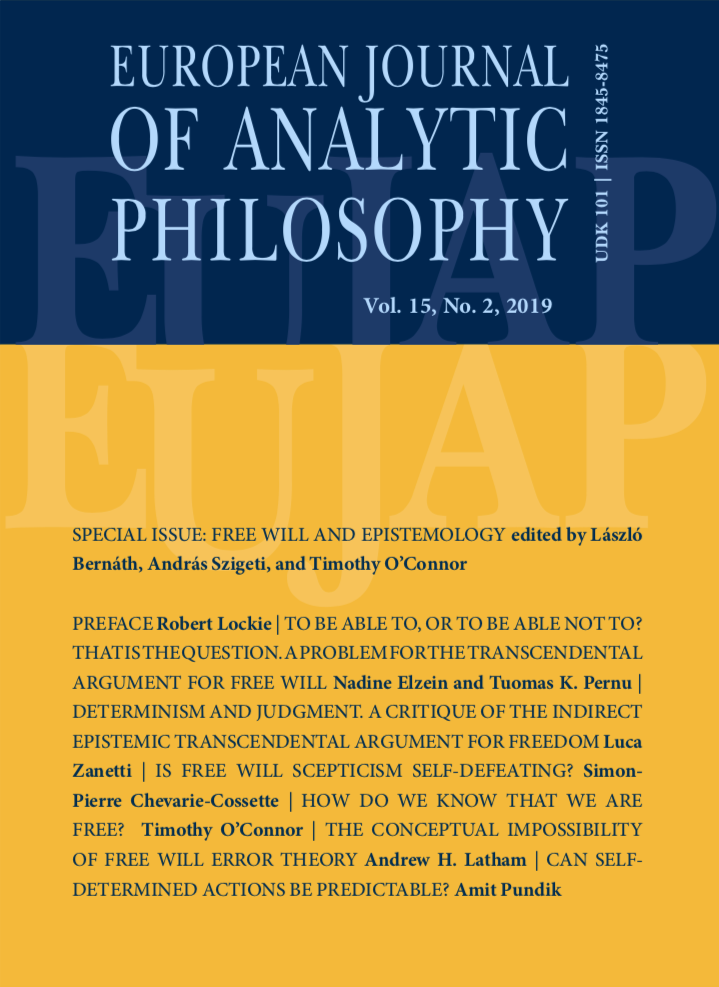- Speaking of the Ineffable, East and West
Graham PriestPages: 6-20 | Abstract
There is a phenomenon that often arises when a philosophy argues that there are limits to thought/language, and tries to jus- tify this view by giving reasons as to why there are things about which one cannot think/talk—in the process appearing to give the lie to the claim. I will be concerned with that phenomenon. We will look at some of philosophies that fall into this camp (those of Wittgenstein, Heidegger, and Mah ̄ay ̄ana Buddhism). We will then see that Buddhist philosophy has resources to address this kind of issue not present in Western tradi- tions, namely the catu.sko.ti and its develop- ments. The catu.sko.ti is a principle to the effect that claims can be true, false, both, or neither. Later developments add a fifth pos- sibility: ineffability. Of course, one might be skeptical that such ideas can be made log- ically respectable. I will show how to do so with some simple tools from contemporary non-classical logic. - Hegel’s Dialectics: Logic, Consciousness and History
Nenad MiščevićPages: 22-34 | Abstract
Graham Priest has brilliantly analyzed Hegel’s dialectics, as far as its logical and abstract ontological (metaphysical) struc- ture goes, and has successfully related it to his own logically sophisticated dialethism. After briefly reminding the reader of his account, the paper turns to the other, not purely logical side of Hegel’s dialectics, and points to his strategy of bringing together ontological, anthropological and historical matters together with the logical structure, in a manner quite foreign to analytic tradi- tion. It concludes with the proposal that Hegel’s way of directly connecting logical ontological, anthropological and historical matters has played the crucial role in the birth of what later became known as specif- ically “continental” philosophy. The paper concludes by raising the question of the re- lation between the two, the abstract logico- ontological approach, favored by Priest, and the rich, anthropologically and historically informed one found in all major works of Hegel. - Some (critical) remarks on Priest’s dialetheist reading of Nagarjuna
Goran KardašPages: 35-49 | Abstract
Graham Priest in collaboration with J. Garfield and Y. Deguchi (henceforth: DGP) wrote several articles and responses arguing that the Buddhist philosopher N ̄ag ̄arjuna was a dialetheist thinker, i.e. that he not just identified and exposed certain contradictions but that he embraced it. These contradictions, according to DGP, always occur “at the limits of thought” i.e. when a certain view at the same time transcends the limit (“transcendence”) and is within that limit (“closure”). In N ̄ag ̄arjuna’s case, these limital contradic- tions arise at the boundary between “conventional reality/truth” (sam. vr.ti-sat/satya) and “ultimate real- ity/truth” (param ̄artha-sat/satya). Ultimate truth is that things lack intrinsic nature (svabh ̄ava), i.e. that they are empty ( ́su ̄nya) of intrinsic nature. This empti- ness is universal and it includes emptiness itself (empti- ness of emptiness). But that means that being empty is intrinsic property of all things so it comes out that things both have (conventional truth) and lack (ul- timate truth) intrinsic nature. This is ontological paradox. DGP identify also semantic and express- ibility paradoxes in N ̄ag ̄arjuna. Although logically coherent and philosophically intriguing, I think that DGP’s interpretation nevertheless overlooks a spe- cial kind of semantics that, presumably, works be- hind N ̄ag ̄arjuna’s reasoning and that would be best described in terms of difference between first and sec- ond order statements, i.e. between terms referring to the world (primary system) and terms referring to the primary system (meta-system, comprising the “meta” concept of emptiness). Working in these two seman- tic levels N ̄ag ̄arjuna, I believe, escapes contradictions — and N ̄ag ̄arjuna is aware of them — that arise “at the limits of thought”. - On probable conditionals
Zvonimir ŠikićPages: 50-55 | Abstract
We compare supports A↑B (i.e. pr(B|A)> p r (B )) with conditionals A → B and prove that the basic properties of supports are exactly the opposite to those of conditionals.. - A Social Pragmatic View on the Concept of Normative Consistency
Berislav ŽarnićPages: 56-78 | Abstract
The programmatic statement put forward in von Wright’s last works on deontic logic introduces the perspective of logical prag- matics, which has been formally explicated here and extended so to include the role of norm-recipient as well as the role of norm- giver. Using the translation function from the language of deontic logic to the lan- guage of set-theoretical approach, the con- nection has been established between the deontic postulates, on one side, and the per- fection properties of the norm-set and the counter-set, on the other side. In the study of conditions of rational norm-related activ- ities it has been shown that diverse dynamic second-order norms related to the concept of the consistency norm-system hold: – the norm-giver ought to restore “classical” con- sistency by revising an inconsistent system, – the norm-recipient ought to preserve an in- consistent system by revision of its logic so that inconsistency does not imply destruc- tion of the system. Dialetheic deontic logic of Priest is a suitable logic for the purpose since it preserves other perfection proper- ties of the system.. - Translating a Suppes-Lemmon Style Natural Deduction into a Sequent Calculus
Edi PavlovićPages: 79-88 | Abstract
This paper presents a straightforward proce- dure for translating a Suppes-Lemmon style natural deduction proof into an LK sequent calculus. In doing so, it illustrates a close connection between the two, and also pro- vides an account of redundant steps in a natural deduction proof.

